- Home
- Joseph Bruchac
Brothers of the Buffalo Page 4
Brothers of the Buffalo Read online
Page 4
“My son.”
Wolf turned toward his mother. She was not asleep after all. Her eyes were open. She had propped herself up on one elbow to gaze across the fire at him. The firelight reflected from her dark eyes. She looked up at him. She looked into him.
My mother knows me well. She knows what I intend. Will she ask me not to risk leaving the agency?
There was a long silence between them. His mother nodded
her head.
“Following Wolf,” she whispered, “be careful.”
A story, a story. Let this story come.
In the time of Bata-Musa in the kingdom of Kabi,
a boy was born who could not walk.
He was strong as a lion, but he could not stand.
He dragged himself about on the ground.
Some made fun of him, but they did not do so when
they were close enough for him to take hold of them, for once he grasped someone with his hands
they could not escape him.
Still, from a distance the other boys
threw sticks and balls of mud at him.
A learned holy man came to Kabi.
He was one who followed the Great God
but he was also one who could speak with the djinnies. He saw that boy and though
the boy was covered with dirt,
though he crawled about like one of the beasts,
he saw something in that boy’s eyes.
So he made a staff of wood and gave it to the boy.
“Lean on this and stand,” he said.
But when the boy leaned on that staff
and tried to use it to lift himself up,
the staff bent beneath his weight and then broke.
Then the holy man gave the boy
a staff made of bamboo, but that staff splintered
when the boy tried to use it to stand.
So the holy man went to the blacksmith and had him forge a staff of iron. It was so heavy that it took three strong men to carry that staff back to the boy.
The boy took that staff with one hand.
He struck it upon the ground
and the earth shook. He grasped it with both hands
and pulled himself to his feet
and now it could be seen
that he was taller than other men.
Then the holy man gave him fine robes
and he put them on.
He gave him a sharp sword and belted it to his waist. He brought him a strong horse that no one had ever been able to ride and that boy climbed onto its back,
a boy no longer.
Now he was a great warrior.
Other men bowed their heads before him in respect.
Fodio-Musa was his name. He was the grandfather
of my grandfather’s grandfather.
As long as we keep his memory,
we will remember that we have
got a warrior’s blood.
That is what my daddy said.
Off with the old rat’s head.
CHOOSING MOUNTS
Camp Supply,
Indian Territory
June 1, 1872
Dear Mother,
I received your letter. It made my heart leap to hear my name called and to have your letter handed to me from the company mail pouch! I am so glad everything is well. I am glad that Pegatha is doing well in school. I am sure she is reading this to you right now. So I say to her a big hello. Hello, my little sister.
I am glad to hear that Mr. Mack is helping out. I remember he was one of Daddy’s best friends and went fishing with Daddy and me. I remember how sad he was not to be able to join the army and march off with Daddy when word came that black men were needed. Mr. Mack had to stay with his wife because she was sick, as I remember. I do remember how sad Mr. Mack was when word came to us of Daddy’s death at the Crater. As were we all.
Let me speak now of happier things. I am now doing even better than before. Josh and Charley and I are best of friends.
The Indians call us Buffalo Soldiers. Is that not a fine name?
There is still no action, no fighting at all. But we are being well prepared.
I send you my love and warmest wishes. Write me again soon.
Your loving and obedient son,
Washington Vance
“That is one mean piece of horseflesh, soldier. You want to keep your distance ’less you want your arm tore off.”
Wash looked over at the stable master. Blood was still seeping through the cloth bandage wrapped around the man’s arm where the big black stallion with the white blaze on its chest had bitten him.
“Best we could do,” the man growled, “is put a slug in that devil’s brainpan.”
Charley Smith tugged at Wash’s sleeve. “Come on, brother. There’s a nice little gelding down the line there would be jes’ right for you. It is jes’ as black as this one and ten times as gentle.”
A black horse. That was what Wash needed. Every man in their company had to be mounted on a horse of that color. It was part of what made the cavalrymen of the 10th stand apart. Not only did they aspire to be twice the horsemen of their white counterparts in other units like Custer’s 7th, they also aimed to look twice as sharp. That was why each company made sure to ride matching steeds. And now every new recruit had his horse except for Wash.
“Why you being so picky?” Josh Hopkins had asked him the day before when Wash had passed by one horse after another from the herd of blacks that had just been driven into Camp Supply by a hostler. “Me, I just took the first horse I saw that fit the bill far as color went. And old Midnight and me gets along fine.”
Wash hadn’t answered that question. Maybe it was because he didn’t know himself for sure what it was that he wanted. Or that it was too hard to explain that it wasn’t just his eyes that had to tell him a horse was right for him. It was something more, something that had to do with his heart and his gut. Or maybe—and he knew this would have made his two friends bust a gut laughing—he needed a horse that needed him.
And that was why he was back standing there, staring at that black stallion rearing up, screaming, and flailing its hooves in the air, trying to break free of the rope that held it.
Wash felt another hand on his shoulder. He turned to look at the stable master. The anger was gone from his face, replaced by something akin to regret.
“Son,” the man said, the growl gone from his voice. “Don’t you think I don’t care about my horses. I love them like they was family. But that one there is as different from the rest as the night from the day. If you think he could be yours, you are just fooling yourself. That horse would as soon kill you as look at you.”
“You sure?” Wash said, turning his gaze back to the black, which had settled down some and was just standing there now. But the fire was not gone from its eyes, and its ears were laid back flat against its skull in a way that told Wash, who had been around horses since before he could walk, it was ready to flare up at a moment’s notice.
“You know something about horses, boy?”
“A little.”
“What you see about that one?”
“It’s smart.”
“You right about that.” The man tapped the bandage on his arm. “No dumb horse could have done this to me. But what else you see?”
“Strong. Broad chest, sturdy legs. A man could ride that horse all day without it wearing out.”
“Un-huh. If it’d let a man get up on its back. So fine looking an animal you’d think one of our officers would have claimed it for his own. But not a one of them gave it a second glance. Now why in the name of all the Saints was that? What else you see about this beast, what one thing?”
Wash studied the stallion. He crouched down low on the ground and walked around the front of the animal slow, not getting within range of its hooves or teeth. Then he saw it. There it was on the left flank. US.
“That,” Wash said, pointing at the brand.
The stable master sho
ok his head in surprise. “Boy, you pretty good. My Lord. Never expected you to see that. But what it is that you see, and what you think it means?”
Wash bit his lower lip. “Wellll,” he said in a slow and careful voice, “that is a new brand, even though that horse has to be at least four years old. Though I’d have to look at its teeth to see how much they are wore down to be sure. And there is no other brand on it, which is strange for a four-year-old horse. So I guess what it means is that it was never branded until just before you got it.”
“And who rides horses with no brands?”
“Indians,” Wash said. “This was an Indian pony.”
The stable master chuckled. “Good thing I am not a betting man, or I would have lost my bankroll betting against your ever figgering out a thing like that. Yessir, by the Jeezus, that is an Indian horse. Likely one stolen by those rustlers what have been raiding all the Indian herds hereabouts for the last few years.”
“I thought it was Indians who was the big horse thieves out here,” Charley said.
“Huh,” the stable master sniffed. “Shows how much you know, soldier. I would wager that these days there’s four horses taken from our Indians for every horse they might steal. Lordy, Lordy! That is one of the things that has them Cheyennes all het up, having those horses they cares so much about rustled in the night and then drove down to Texas or up to Kansas to be sold. Not that I sympathize so much with the Indians, but I can sort of understand why every now and then some young brave decides to go off on a little horse-taking venture of his own. Half the time they are trying to steal back their own steeds.”
“My, my,” Charley said.
“My, my indeed,” the stable master echoed, dusting his hands off one against the other. “So that is why what you see here,” he waved a hand toward the stallion, which shied back from him at the gesture, “is a certain kind of horse that is no good to us. The army was cheated when they bought this animal, not noticing anything strange about it seeing as how it was in a herd of similar critters.”
“What kind of horse?” Charley asked.
The stable master turned a pitying glance his way. “Young man, you might pay attention to your friend here. He may be half your size, but he has twice your horse sense.” He patted Wash on his shoulder. “You want to tell him?”
“I guess,” Wash said, “that horse has decided that it just likes Indians and will abide nobody else.”
“That is right,” the stable master said. “And that horse is not about to change its tune. Lord knows. Nossir.”
As the man spoke those words, a thought came to Wash’s mind. He turned back to study the black stallion again, dropping back into a crouch.
Charley took a long look at Wash. Then he lifted his hand up to his chin. “You said you was not a gambling man,” he said to the stable master, taking him by the arm and drawing him away. “You sure about that? ’Cause I do have a little bet I would like to make with you.”
As the two of them walked away, Wash began to draw a pattern in the soft earth between him and the big horse. A song began to sing itself in Wash’s mind, an old song that his father had taught him.
As he heard it, he remembered the words his father had said to him before singing that song for the first time.
“This is a song from your mama’s grandfather, Great-Grampa Hausaman. He was an old, old man when I knew him and he gave me that song. But he was born free in Africa on the banks of old River Niger. He was a prince there, rode a great black horse and carried a lance and a sword like one of the knights of the round table. He could make a horse do anything for him. He knew the Horse Song. And though we are not free, we have his blood. We have his song.”
The song had made its way to Wash’s lips now. He ran his hand back through his short wavy brown hair, then opened his mouth and let the song free, soft at first, no louder than the whisper of fingers across the top of a drum.
Fodio-lay, Gunba
Gaban-gari, Kanta.
The black stallion’s ears lifted an inch and its head turned to look down at him as he continued to draw the pattern he had been taught by his father. Circles and lines intersecting and swirling. Wash moved forward as he continued to sing.
Fodio-lay, Gunba
Gaban-gari, Kanta.
Fodio-lay, Gunba
Gaban-gari, Kanta.
A little louder now, his finger still drawing in the dirt, extending the pattern of crisscrossing lines and sweeping circles. Now his side was toward the stallion, whose head was lowered, its ears raised as it gazed at the pattern. Still singing, his back now to the big horse, Wash could feel its hot breath on his neck and cheek. He stood up slowly, reached one arm out, reached up so that he was embracing the neck of the black stallion, its cheek now pressed against his.
Wash stopped singing. He turned, placed his hands on either side of the horse’s big head, and looked it in one eye and then the other. Then he closed his eyes and leaned close.
“I’m Wash. You know me now,” Wash whispered into the horse’s right ear. “You are Blaze. Wash and Blaze. We belong to each other.”
“Holy jumping Judas priest!” a voice said from a few yards away. “I do not believe it.”
“Believe it, my man. And pay what you bet.”
Wash opened his eyes to look. The stable man was shaking his head in disbelief as he counted out coins into Charley Smith’s outstretched palm.
“Huh!” said a deeper voice from behind him. Wash turned. It was Sergeant Brown. “Trooper,” he said, pointing a big finger at Wash’s chest, “seems I might have been wrong ’bout you.”
Mama’s stories also were ones that you had to think about, but not the same way as Daddy’s. His were of the past. Hers were of the way the world is today.
Old Rooster was roosting high in a tree, way up where Brother Fox couldn’t get him. Brother Fox came by and called up to Old Rooster.
“Morning, Brother Rooster.”
“Morning, Brother Fox,” Rooster said back.
“Come on down here. I have got some good news that you are going to want to hear.”
“No sir,” Old Rooster replied. “It is way too early in the morning for me to come down. You just go ahead and tell it to me from where you are. I can hear you real good.”
“Well,” Fox said, “it is fine news, indeed. The law has been changed. From now on in, the law says that hounds are supposed to run no more foxes and foxes are supposed to eat no more roosters and hens. So come on down here.”
But Old Rooster, he just cocked his head like he was listening to something.
“You hear that?” Old Rooster asked.
“What you hear?” Fox said back.
“What I hear is the hounds. They are going ah-wooo, ah-wooo, and they are all heading this way.”
“Well,” Fox said, “I do believe I had better get going down the road.”
“What are you scared of?” Old Rooster said. “Now that the law been changed, hounds not supposed to run no more foxes.”
“Yes, sir,” Fox said back. “But some of them hounds are awful lawbreakers.”
OLD LANDRIEU
Petersburg, Virginia
June 8th, 1872
My Dear Son Washington,
The money you send us came here. Thank you so much. It was more than we expect. I hope you save enough to take care of yourself. I use some of the money to buy new tools and also a bonnet for myself and dress for Pegatha. She has grown so much she needed a new dress.
Washington, this is Pegatha. I have grown. I am now taller than you. Does that mean I am now your big sister and you are my little brother? Ho ho!
I hope your sister Pegatha is writing just what I say. I am.
She promises me she is taking down ever word I speak. It is a warm spring and summer. We think the crops will be good. We are eating well. Poor Mr. Moses Mack was thin as a starved horse. Now he is putting some weight on his bones.
We glad you safe and doing well. Be brave, but do not risk y
ourself. Please. We want you home when you are done being a cavalryman.
Say hello to your friends Charles and Joshua from your mother.
And your BIG sister!
Your loving mother,
Mama
A man could fry an egg on a flat rock out there in that sun.
Wash wiped his forehead with the end of his bandanna. From the shady place near the blockhouse where he was walking back and forth on duty, he could see the wide expanse of land to the west of Camp Supply. Nothing moving out there, unless you counted the dry earth itself, which seemed to ripple in the heat.
Not much to look at.
But neither, Wash thought, is Camp Supply.
His first impression of the square of rough-made buildings and stockade walls of logs had changed little since his first sight of it, of the long rows of officers’ cabins connected one to the other by the little porches on the sides—if you could use the word porch for a passageway so narrow that a man could stretch out his arms and reach from one cabin to the other. Add in the blockhouses built into two of the facing corners, the tents set up along the inner east wall for the use of the white non-coms, the outside stables, and the other tents for enlisted men, and there you had it. The whole of Camp Supply.
Frontier living, for sure, not that much better than the tipis the Osage scouts set up over the rise on the prairie.
“In some ways,” Josh had said when they climbed that rise and he pointed out the Osage lodges to Wash, “them Indians have got it better than us. Indian tipis stays cooler than cabins in summer, and I have heard that with a good fire and the flaps closed they be a sight warmer in winter than our tents and log quarters. You never hear none of them Indian women complaining like the wives of our white officers, wailing about their quarters being more like shed barns than proper houses.”

 Peacemaker
Peacemaker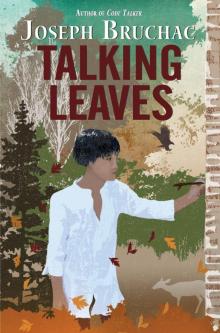 Talking Leaves
Talking Leaves Found
Found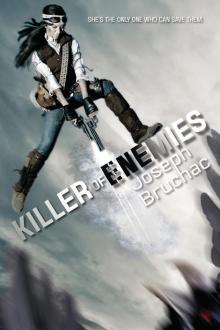 Killer of Enemies
Killer of Enemies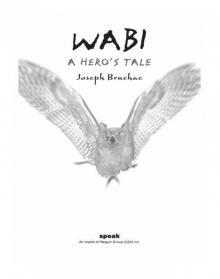 Wabi
Wabi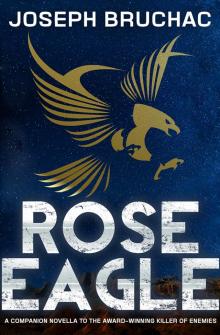 Rose Eagle
Rose Eagle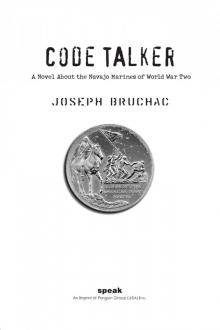 Code Talker
Code Talker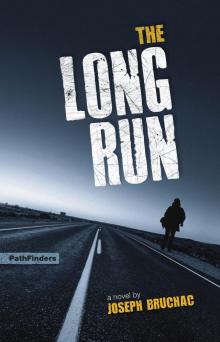 The Long Run
The Long Run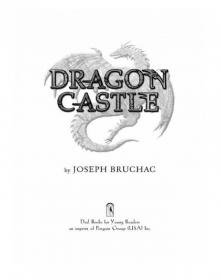 Dragon Castle
Dragon Castle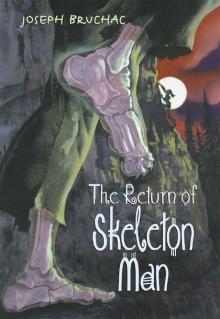 The Return of Skeleton Man
The Return of Skeleton Man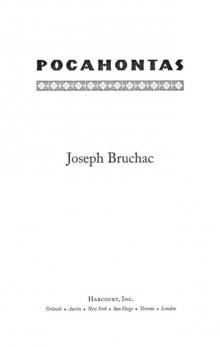 Pocahontas
Pocahontas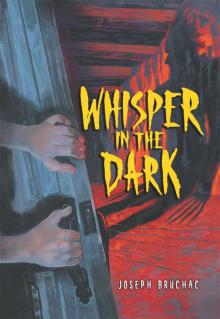 Whisper in the Dark
Whisper in the Dark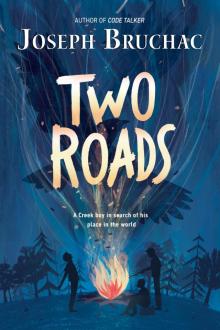 Two Roads
Two Roads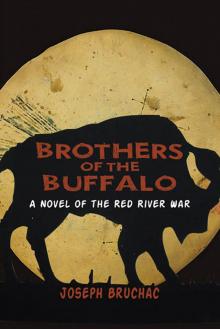 Brothers of the Buffalo
Brothers of the Buffalo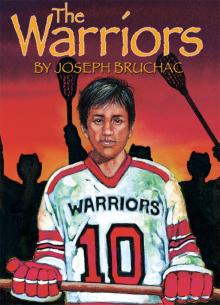 The Warriors
The Warriors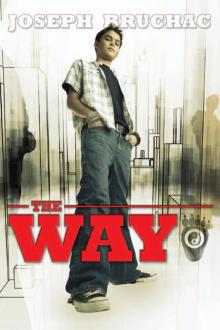 The Way
The Way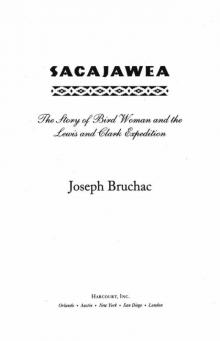 Sacajawea
Sacajawea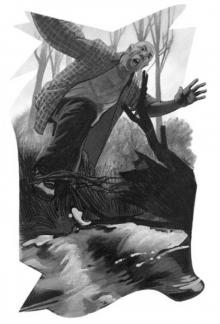 Night Wings
Night Wings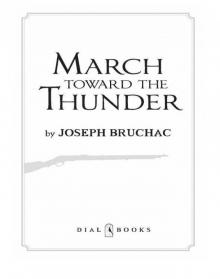 March Toward the Thunder
March Toward the Thunder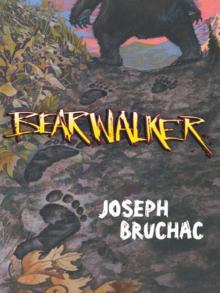 Bearwalker
Bearwalker Skeleton Man
Skeleton Man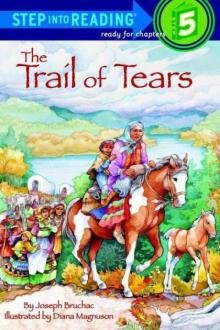 The Trail of Tears
The Trail of Tears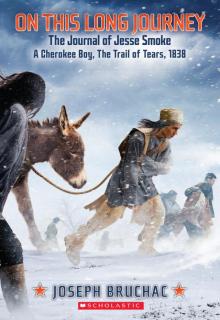 On This Long Journey
On This Long Journey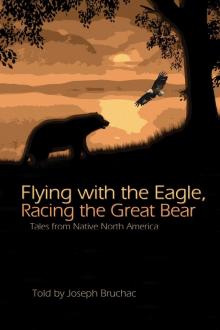 Flying with the Eagle, Racing the Great Bear
Flying with the Eagle, Racing the Great Bear